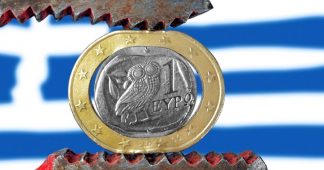9 July 2018
The European Union has no other adjustment program for Greece, EU Commissioner for Economic and Financial Affairs Pierre Moscovici said at the meeting with Greek Prime Minister Alexis Tsipras, July 3.
“Greece is now a normal country in the Eurozone, with the European semester; you will have the usual procedures. When a country is under the supervision of the Eurogroup, it takes only five minutes, without negotiations, just to make sure that the obligations are being fulfilled,” Pierre Moscovici stressed.
In turn, Prime Minister of Greece noted that it would not be easy for the citizens of the country to immediately feel the changes after eight years of heavy economic sacrifices.
“The fact is that after all Greece managed to have a successful conclusion of the last bailout program. This is a historical change. I think that people will start feeling the change day by day, but the most significant fact for Greece is that from now and then the elected governments will have the right to choose the means with which they will reach the goals, the targets in the framework of our common European decisions. This is very important,” the politician said.
Earlier, Eurozone ministers have declared the end of Athens debt crisis, agreeing the terms to ease Greece’s exit from 2010 rescue program.
“Today the institutions confirmed Greece has implemented all the 88 prior actions under the fourth and final review. This shows Greece has successfully completed its ESM program,” Eurogroup President Mario Centeno said at a press conference.
He also added that the ESM will disburse 15 billion euros to Greece as the last program tranche.
“Out of this total amount, 5.5 billion euros will be disbursed to the segregated account, to be used for debt servicing and 9.5 billion euros will be disbursed to a dedicated account set up to build up cash buffers, to be used for debt service in case of needs,” the statement of the Eurogroup says.
Analyzing the situation with the Greek economy, Lorenzo Codogno, Founder and Chief Economist, LC Macro Advisors Limited, came to the conclusion that de facto, both Greece and the creditors got what they wanted.
“The Greek government wanted a sufficiently clear exit, or at least a post-program designed more as a support to Greece than as an extension of the program. The authorities had it all by claiming victory for the exit but also keeping a strict control in line with the agreed post-program. The conditionality refers to fiscal and fiscal structural, social welfare, fiscal stability, with the Commission that will activate the enhanced surveillance procedure, with quarterly reviews,” the analyst explained.
From his point of view, financial markets should welcome the decision.
“It safeguards from any unexpected departure from the policies of the program while providing sufficient debt relief to allow Greece to hope to walk with its legs in a not too distant future,” Lorenzo Codogno said.
He also reminded that Managing Director of the International Monetary Fund Christine Lagarde said that the IMF is confident about the medium-term sustainability of Greek debt but drew attention to a number of parameters, including gross financing needs and the very long time horizon.
“What the IMF is saying is that debt is sustainable up to a specific date, while it is de-facto conditionally sustainable beyond that date. The IMF committed to preparing an Article IV on Greece in which the DSA [debt sustainability analysis] will be updated, possibly already in July. It is not clear what the outcome of the DSA will be, but this ‘conditional sustainability’ could feature high. It must be said that the IMF is no longer able to hold the process hostage, and nobody expects the IMF to have any role in future financing. Still, the IMF will remain ‘fully engaged’ to provide credibility to the process and analytical support,” the expert added.
In his opinion, the measures agreed upon in the EU are a good basis, allowing Greece to regain a credible and sustainable market assess.
“At this point, the feeling is that there is enough cash buffer up until Greece can safely restart the issuing program, and sufficient conditionality to provide enough guarantees to financial markets that the situation will not derail over at least a couple of years,” Lorenzo Codogno said.
Meanwhile, Neil MacKinnon, Global Macro Strategist at VTB Capital, expressed an opposite opinion on the state of affairs in the Greek economy.
“Greece is caught in a debt trap and Brussels-imposed fiscal austerity created an economic depression which means that Greece is unable to reduce its debt-load which currently stands at 190 percent of GDP,” the analyst explained.
According to him, the country will remain dependent on the European Union for a long time.
“Even after debt restructuring and so-called debt relief – official creditors just extend the period of repayment – Greece will still be paying the EU until 2060. This is loan-shark economics and Greece has essentially become a ‘vassal state’ of the EU,” Neil MacKinnon said.
In turn, Patrick Sensburg, German MP from the CDU/CSU fraction, drew attention to the improvement of economic performance in the country.
“The economic development of Greece is positive and tax revenues of the state have increased in recent months and years. This shows that the Eurozone loan program and the reforms have a positive effect. After eight years of financial support, for the first time Greece will be able to support itself again this year without relying external financial aid by the EU. It will take several years before Greece will achieve a stable economic position again, but the country is on the right way and its outlook is more positive,” the German deputy said.
Commenting on the decision of the Eurogroup to stop financial support for Greece, the politician noted that this is a positive signal.
“It is a positive signal that the financial resources of Greece’s last bailout program have not been fully used up. Of the 86 billion euros provided, 62 billion euros were actually needed. This would have been unthinkable at the start of the aid programs for Greece eight years ago. However, Greece has made reforms and has to continue on its way,” Patrick Sensburg explained.
“Another positive signal is the assessment by the US rating agency Standard & Poor’s, which has raised Greece’s creditworthiness on the grounds of, among other things, the development of financial reserves and the recent debt relief agreement,” German MP from the CDU/CSU added.
At the same time, it is extremely important that Greece remains on its reform path, he said.
“A debt relief or debt restructuring with Germany will not take place. In Addition, the country’s continuing stable development will remain to be a condition after the aid program comes to an end. The agreed final payment of around 15 billion euros is another sensible incentive to make Greece more attractive to capital markets and foreign investors improving economic growth. Furthermore, Greece needs to become even more competitive in major sectors such as tourism,” Patrick Sensburg said.
Meanwhile, Fabio Masini from Department of Political Science at University of Roma Tre, Vice-President Italian Council of the European Movement, Managing Editor History of Economic Thought and Policy, Managing Director International Centre on European and Global Governance, expressed the opinion that for today Greece economy is performing much worse than it did before the crisis burst out.
“Its GDP is just a bit more than 50 percent of the GDP in 2008. The official unemployment rate rose from 6 percent to 22 percent. Public debt rose from 110 percent to 180 percent of the GDP. The quality and quantity of public goods available for citizens and firms deteriorated or decreased. Definitely not a healthy economy,” the expert said.
The poor and worsening performance of Greece economy is a signal that, beyond conjuncture, ‘the crisis’ is not over, he said.
“And maybe it will never be, in the current structure of the Eurozone governance. Austerity does not trigger growth, nor does it raise productivity, which actually depends mostly on updated machine and human capital, infrastructures, innovation and research. Austerity at the national level to comply with the Eurozone parameters is sustainable in the long run only if there is a supranational budget devoted to countercyclical injections of liquidity, which is not in sight in the Eurozone,” Fabio Masini said.
According to him, the life of people already worsened quite sharply in the last ten years.
“Greek people already paid a lot for the financial rescue plan. I do not expect this to end. Secular stagnation is the most likely outcome. And more vulnerability to foreign investment might trigger further speculation and crisis cycles as well as social or political tensions that might become difficult to control,” the analyst explained.
“With the current structure of the Eurozone governance, Greece might only be one of the pieces of a more general collapse of the EU, if collective decision-making in the EU, its institutional structure and policy stance will not change dramatically in the next future,” he concluded.
Published at https://penzanews.ru/en/analysis/65534-2018











